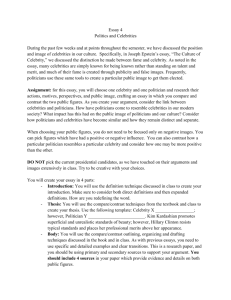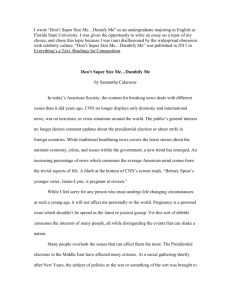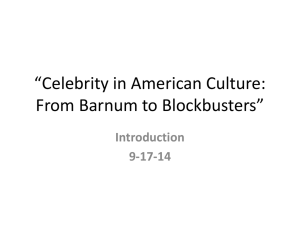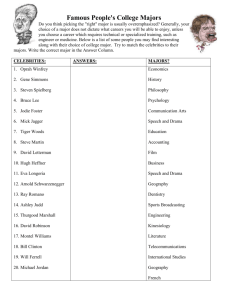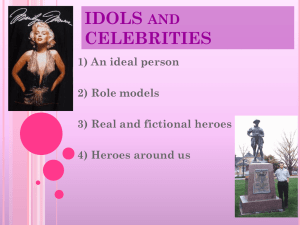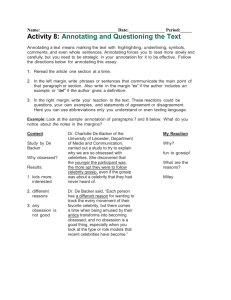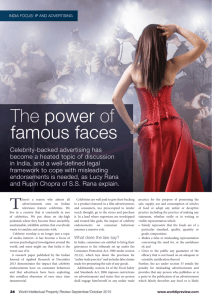"The Impact Celebrities Have on Our Lives" Article
advertisement
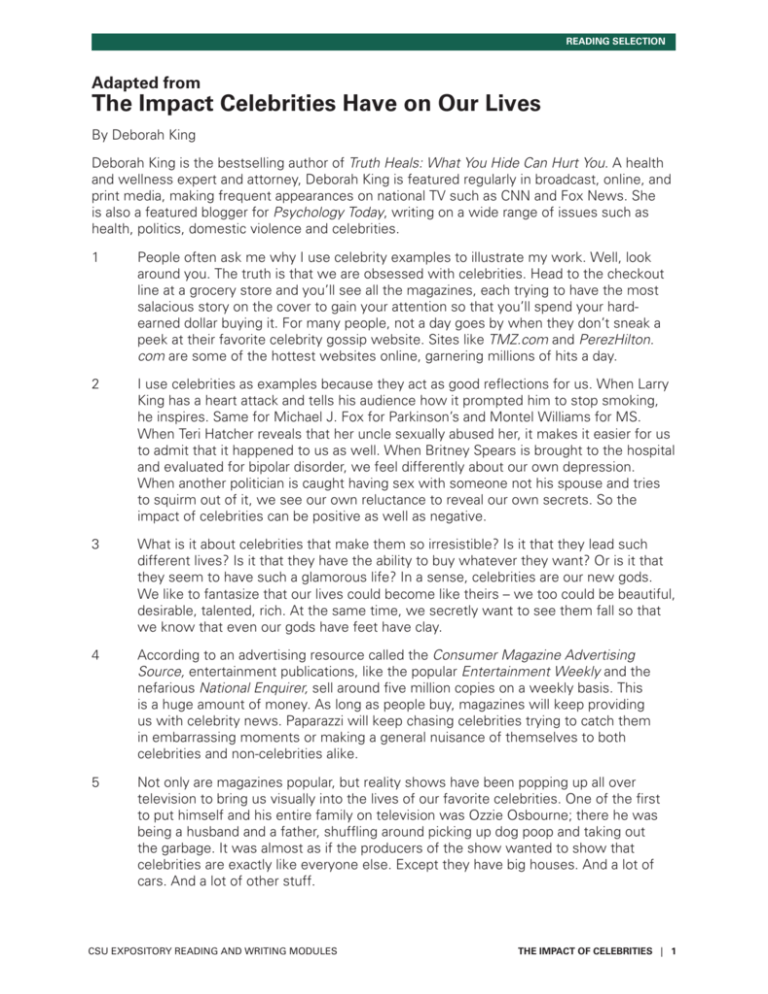
READING SELECTION Adapted from The Impact Celebrities Have on Our Lives By Deborah King Deborah King is the bestselling author of Truth Heals: What You Hide Can Hurt You. A health and wellness expert and attorney, Deborah King is featured regularly in broadcast, online, and print media, making frequent appearances on national TV such as CNN and Fox News. She is also a featured blogger for Psychology Today, writing on a wide range of issues such as health, politics, domestic violence and celebrities. 1 People often ask me why I use celebrity examples to illustrate my work. Well, look around you. The truth is that we are obsessed with celebrities. Head to the checkout line at a grocery store and you’ll see all the magazines, each trying to have the most salacious story on the cover to gain your attention so that you’ll spend your hardearned dollar buying it. For many people, not a day goes by when they don’t sneak a peek at their favorite celebrity gossip website. Sites like TMZ.com and PerezHilton. com are some of the hottest websites online, garnering millions of hits a day. 2 I use celebrities as examples because they act as good reflections for us. When Larry King has a heart attack and tells his audience how it prompted him to stop smoking, he inspires. Same for Michael J. Fox for Parkinson’s and Montel Williams for MS. When Teri Hatcher reveals that her uncle sexually abused her, it makes it easier for us to admit that it happened to us as well. When Britney Spears is brought to the hospital and evaluated for bipolar disorder, we feel differently about our own depression. When another politician is caught having sex with someone not his spouse and tries to squirm out of it, we see our own reluctance to reveal our own secrets. So the impact of celebrities can be positive as well as negative. 3 What is it about celebrities that make them so irresistible? Is it that they lead such different lives? Is it that they have the ability to buy whatever they want? Or is it that they seem to have such a glamorous life? In a sense, celebrities are our new gods. We like to fantasize that our lives could become like theirs – we too could be beautiful, desirable, talented, rich. At the same time, we secretly want to see them fall so that we know that even our gods have feet have clay. 4 According to an advertising resource called the Consumer Magazine Advertising Source, entertainment publications, like the popular Entertainment Weekly and the nefarious National Enquirer, sell around five million copies on a weekly basis. This is a huge amount of money. As long as people buy, magazines will keep providing us with celebrity news. Paparazzi will keep chasing celebrities trying to catch them in embarrassing moments or making a general nuisance of themselves to both celebrities and non-celebrities alike. 5 Not only are magazines popular, but reality shows have been popping up all over television to bring us visually into the lives of our favorite celebrities. One of the first to put himself and his entire family on television was Ozzie Osbourne; there he was being a husband and a father, shuffling around picking up dog poop and taking out the garbage. It was almost as if the producers of the show wanted to show that celebrities are exactly like everyone else. Except they have big houses. And a lot of cars. And a lot of other stuff. CSU EXPOSITORY READING AND WRITING MODULES THE IMPACT OF CELEBRITIES | 1 READING SELECTION The Fascination Obsession 6 Why are we obsessed with celebrities? Some believe we are obsessed with celebrities because we need to have an escape from the humdrum of everyday life. This makes sense in a bizarre sort of way. For instance, if you are not centered and balanced energetically, and you don’t feel so good about who you are, you are much more likely to follow your favorite celebrity and wish that you could be them. Others theorize that we mentally stalk celebrities because we are waiting for them to fail. Much like the Roman spectators waited for the gladiator to lose his battle and die, we too are waiting for celebrities to flame out and reach some sort of a bottom that makes them seem a little more human and more like us. 7 Dr. Charlotte De Backer of the University of Leicester, Department of Media and Communication, carried out a study to try to explain why we are so obsessed with celebrities. She discovered that the younger the participant was, the more apt they were to follow celebrity gossip, even if the gossip was about a celebrity that they had never heard of. 8 Dr. De Backer said, “Each person has a different reason for wanting to track the every movement of their favorite celebrity, but there comes a time when being amused by their antics transforms into becoming obsessed, and no obsession is a good thing, especially when you look at the type or role models that recent celebrities have become.” 9 The sad fact is that we are more enthralled by celebrities who have bad reputations than celebrities who are excellent role models. As parents or mentors, we have to be careful what we allow children to see and listen to. Some parents seem to believe that all celebrities are worthy of being role models. Unfortunately, this is far from the truth. Fast Reporting or Bad Celebrities? 10 There was a time when you could stand up and cheer for Babe Ruth. You could be proud that your son had all of his baseball cards and that he wanted nothing more than to be the Babe when he grew up. The average fan, however, didn’t know what Babe did behind closed doors. His private life was private. 11 Now, however, thanks in part to the Internet, it is much easier to find out about everything a celebrity has ever done. You can’t avoid knowing that Winona Ryder has been arrested and convicted of shoplifting, or that Mel Gibson has a problem with alcohol. If a celebrity does something good, it takes a team of PR professionals to get it into the mainstream media. If a celebrity does something bad, or if something tragic happens, it’s all over the celebrity gossip sites in a matter of minutes. 12 Take, for instance, the story of Heath Ledger. Heath was an actor who had received critical acclaim for some of his work. You may have seen a few photos of him here and there, and sometimes the paparazzi would try to get onto one of his movie sets, but they were very undemanding of his time compared with other celebrities. 2 | THE IMPACT OF CELEBRITIES CSU EXPOSITORY READING AND WRITING MODULES READING SELECTION 13 Then, on January 22, 2008, the media heard rumors that Heath Ledger had been found unconscious in his New York apartment. Minutes later, updates starting flying onto the Internet. Some talked about a mysterious connection with actress Mary-Kate Olsen and his use of hard drugs like heroin; others said Heath had committed suicide. Due to the speed of the Internet, people were contemplating the cause of his death only minutes after he was found and the authorities were called. 14 Almost two weeks later the toxins report was completed and it was said that Heath died due to an accidental overdose of prescription medications. Even though little media attention had been placed on her before, his surviving daughter, Matilda Rose, was suddenly one of the most photographed children on the planet, with her face appearing on dozens of different magazines. The Positive Celebrities 15 Even though there are more stories about celebrities who have a negative influence on us and the decisions we make in our lives than there are positive actions, there are some celebrities who use their fame to bring about change and are good celebrity role models. Take Bono, singer of the popular band U2. Since 1999, Bono has been campaigning for third world debt relief and helping to raise awareness of the plight of those living in Africa. He has met with many influential politicians and has taken the United States Treasury Secretary, Paul O’Neill, on a tour of parts of Africa to show him first-hand what those living in poverty are facing. He and Bobby Shriver also started Product Red, a commercial initiative to help fight against AIDS, malaria, and tuberculosis around the world. 16 Angelina Jolie is another celebrity who, although she had a very rocky and well-known past, has come to be one of the great spokeswomen about the living conditions children in various third world countries face, and was given the title of UNHCR Goodwill Ambassador in 2001. “We cannot close ourselves off to information and ignore the fact that millions of people are out there suffering. All of us would like to believe that if we were in a bad situation, someone would help us,” Ms. Jolie said during the press conference to announce her ambassador status. The Mirror Effect 17 We are a fame-obsessed culture, but then, we have always been so; technology has simply made it easier. If you spend more time finding out which of your favorite stars went to dinner last night and who they went to dinner with, you may want to reexamine your own life. Is there anything missing from your life that you could better use that time to fill? Friends? Exercise? 18 Truth heals, and the truth is that celebrities, as much fun as our fantasies of them may be, can actually serve a purpose in our lives. Which celebrities are you most enthralled by? Do you understand why? When you look in the mirror and delight in your Rachel haircut, or despair that you will never have Halle Berry’s body, what is the comparison saying to you? Does Bono’s activism inspire you, or are you more likely to want to imitate the “I don’t give a damn” attitude of many in the pages of the media? Do you feel compassion for Britney Spears as she battles her inner demons, or do you think she deserves no visitation with her kids? 19 The stars are out there, big and bright. Let’s get the stars rising in ourselves. CSU EXPOSITORY READING AND WRITING MODULES THE IMPACT OF CELEBRITIES | 3

